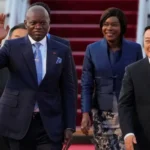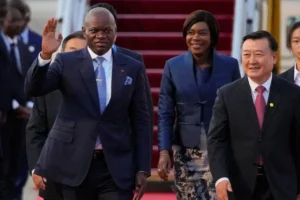The story of Mohamed Ben Attia’s third feature, a drama titledBehind the Mountains screening at the Venice Film Festival, is truly one of a kind. After a severe mental breakdown results in a violent outbreak, a forty-something man called Rafik (Majd Mastoura) ends up spending four years in jail. Upon his release, he kidnaps his son Yassine (young Walid Bouchhioua) and takes him far away to show him “a beautiful place behind the mountains.” On their path to this mysterious place, they bump into a bizarre shepherd (Samer Bisharat), while fleeing from law enforcement.
A co-production between Tunisia, Belgium, France, Italy, Saudi Arabia and Qatar, the feature had its world premiere in the Orizzonti strand of this year’s Venice Film Festival, which runs until Saturday. When asked why he decided to tell a story with a flying father as its lead character, Ben Attia tells The National: “It was a very old image [I had in mind], the image of this guy floating in the air, and that was around 15 years ago. Back then, I felt it was a little bit childish, and I wasn’t very interested to work around this first image.”
“Five years ago, when I wrapped my second film [Dear Son], it came back. I felt I could link this image to the idea of being detached – in this violent way – from the Earth, from the community, and from your own body, in order to set yourself free. But it’s not only a matter of freedom.” In fact, Rafik’s ability to fly is also a plot device that allows Ben Attia to explore in depth the topic of mental health issues. Ben Attia began working on the script two years ago and chose the actor playing Rafik, Mastoura, before he started writing the film.
“He was the leading actor of my first feature, Hedi. So we have developed a very strong bond, and I was sure from the very beginning Rafik was him,” he says. Ben Attia admits he was much more concerned about casting the right actor for the role of Yassine. “It’s been hard. Luckily, my producer found him [Bouchhioua], and since she knows me very well she didn’t tell me: ‘Look, it’s him!’. Instead, she offered me 30 candidates, saying she loved one of them in particular and was hoping I would pick the same one.”
Ben Attia and his producer chose the same actor, and that’s how Bouchhioua was chosen for the part. Building a connection between the child actor, Mastoura and the director was mostly “a matter of time,” with the three spending time eating and chatting. They became quickly very close, and this helped them to build trust. Throughout the creative process, Ben Attia worked on balancing the story’s supernatural component – making sure it was present but in the background – with his bold sociopolitical stances.
One of the aspects he wished to explore in his film, he says, is “the difference between radicalisation and radicality. For me, we’re missing more and more the beauty of the word ‘radicality.’ That’s why I want the character of Rafik being someone who doesn’t accept any compromise.”
On his collaboration with director of photography, Frederic Noirhomme, he explains they didn’t work on specific visual references, but the beauty of the Northern Tunisian landscape. Some test shoots on location helped them to focus on a palette based on winter colours, with its various shades of green.
The producers of Ben Attia’s film include – once again – the Dardenne Brothers: “We started [working together] from the script phase. We set up many Skype calls, during which we were open to questions or ideas coming from them. Then we got out of touch during shooting. After that, we began speaking again during the editing, just to make sure that everything was in the right place.”
Zooming in on the post-production phase, he adds: “My editor Lenka Fillnerova did a very good job. Usually, I’m very present [in the editing room]. We started that way but halfway she asked to be left alone for a week. She later suggested many things I couldn’t imagine without having an external viewpoint.”
With Behind the Mountains, Ben Attia hopes that the topic of mental health will resonate far beyond Tunisia and the region. “[My film] is more about this feeling of malaise present in modern society, it’s about not being sure about our place in family, on the workplace … It prompts questions about how life can be different, and it’s a very contemporary topic.”
Source: NARTS & CULTURE















